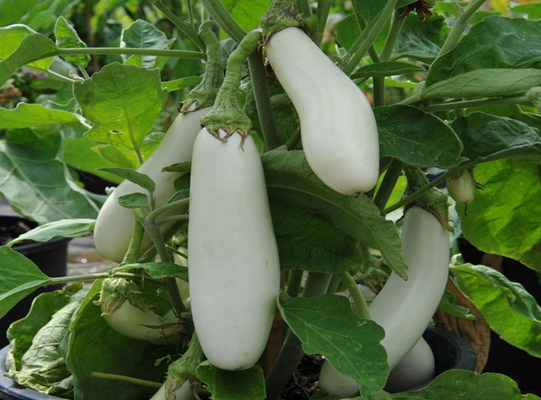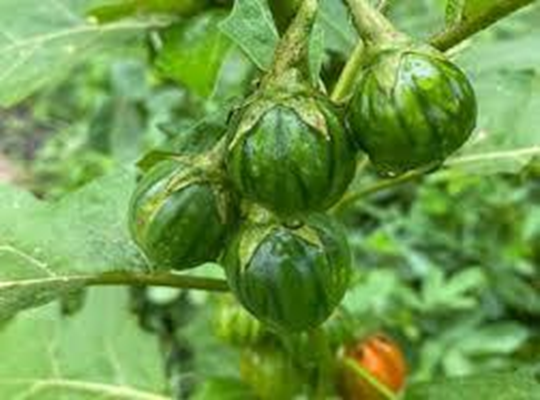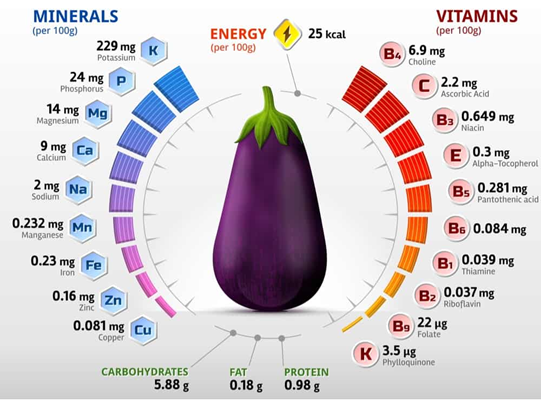Eggplant – Explore How Amazing It is for Your Health
Eggplant – A fruit that not only looks good but also tastes so incredible. Above all, it is packed with surprising health benefits too.
What a wonderful addition to the table!

Many of us would definitely be familiar with eggplants that are found in dark purple color in an oversized shape.
The size, color, and shape vary from region to region- you can find small and oblong to long and thinner eggplants, ranging between white, purple, and green colors. That’s the uniqueness of eggplant!

Do you know that one serving of eggplant has the potential to provide daily requirements of 5% of nutrition, including copper, fiber, manganese, thiamine, and B-6? Few bites of eggplant but plenty of health benefits!
Are you wondering how eggplant can serve your physical health? What is its nutritional value, and what are the best ways to consume it? Scroll down to explore a handful of information.
This blog will focus on a comprehensive history of eggplants, their nutritional benefits, types, recipes, and various other considerations.
Let’s begin!
The Trade and History of Eggplants in Ghana
Although there isn’t any consensus about eggplant’s history and its place of origin, it has been described to be native to India for more than 1500 years. However, since prehistory, the plant and its species are cultivated in Southern and Eastern Asia.
Do you want to know how eggplants make their way into Ghana? According to The Elegant Eggplant Journal, Arabs exported and introduced eggplants to Europe, and Persians transported this bright and elegant veggie to Africa and Ghana.
Eggplants are widely cultivated throughout West Africa, including Ghana. Along with chili pepper and tomato, eggplants mark the three most-consumed veggies in Ghana, Africa.
Since Ghana produces and consumes eggplants in larger quantities, the United States Agency for International Development and the West Africa Trade Hub (USAID and WATH, 2005) reported that the Eggplant export increased threefold from 1996 to 2003.
Available Types of Eggplants
You might have seen people calling different names to refer to eggplants. Mostly, they mix garden eggs with eggplants which isn’t true as both aren’t the same.
Here are different types of eggplants that can savor your plate:
- Graffiti Eggplant
- Italian Eggplant
- Fairy Tale Eggplant
- Garden egg Eggplant
- White Eggplant
- Indian Eggplant
- Little Green Eggplant
- Thai Eggplant
- Japanese and Chinese Eggplant
Among all these, Graffiti and Indian eggplants are considered to be the most famous and widely used ones. Considering the African countries and Ghana, the garden egg is a prominent name, whereas it’s indigenous or native to sub-Saharan Africa.
You might be wondering, ‘Are garden eggs the same as eggplant?’ Statistically, garden eggs are a type of eggplants, but people usually call all kinds of eggplants garden eggs across many regions and do not differentiate.
Are you curious to know what the garden eggs taste like? Well, the African eggplants are yummy but slightly bitter in flavor. There are numerous varieties of eggplants, but the most famous are Southeast Asian and West African families.

How Do We Eat Eggplants?
These versatile fruits can be eaten boiled, sautéed, raw, and in soups, but they are super delicious in all ways.
Unfortunately, eggplants contain a compound known as Polyphenols that may give them a bitter taste, and that’s why some people don’t like their taste. Still, eggplant is consumed all around the globe in many different ways.

You can cook it with other veggies or curd for a perfect dinner. You can also make eggplant puree served with nicely boiled rice and steaks.
Moreover, eggplant soup is another out-of-the-box recipe. Are you wondering how you can prepare eggplant soup with meat in Ghana?
Ghanaian Garden Egg Stew is a locally famous dish made with eggplants, fresh Tilapia, Tomatoes, Scotch bonnet pepper, and Kpakpo Shito. Try it, and you will love it!
You might also like: Spinach 101: Everything you need to know about your green friend
What are the Health Benefits of Eating Garden Eggs?
Eggplants are a rich source of antioxidants and plenty of other phenolic compounds. They exclusively help the body eliminate free radicals to prevent a whole range of diseases, including heart and muscle health.

Eggplants also contain anthocyanins, nasunin, zeaxanthin, and lutein, along with antioxidants to pamper human health.
They are a complete nutritional package, and some significant health benefits of eating eggplants are:
● Support Heart health
As mentioned above, a serving of eggplant contains a handsome amount of fiber, Vitamin C, Potassium, Antioxidants, and Vitamin B-6 that support heart health.
Eggplants are also rich in Anthocyanins. A 2019 study reveals that consuming food rich in flavonoids like anthocyanins decreases the risk of heart issues by reducing the levels of inflammatory markers.
In another study, it was also observed that the women who tend to eat food rich in anthocyanins manage to maintain lower blood pressures, and their chances to experience artery stiffness also decrease significantly.

● Blood cholesterol
Are you wondering how eggplant can help in maintaining your blood cholesterol? Actually, eggplants contain fiber, and this fiber helps control cholesterol levels.
Don’t be surprised if you hear that a cup of cooked eggplant cubes carries around 2.4 g of fiberTrusted Source. Such an immense amount of fibers in 1 cup (weighing 96 grams) is genuinely great.
If you are stressed due to high cholesterol, add eggplant to your diet, and see what wonders it will bring in your life.
● Cancer
The eggplants’ benefits are not just restricted to heart diseases or reducing the risk of cholesterol; they also save your body from cancer.
Eggplants contain anthocyanins and chlorogenic acid powerful enough to protect your body cells from the damages of free radicals.
For long-term benefits, this eggplant assists in reducing the spread of cancer cells and tumor growth.
● Cognitive Function
The eggplant skin contains an Anthocyanin named Nasunin that exclusively helps prevent the damage to brain cell membranes caused by free radicals. This Nasunin also plays a vital role in transporting the nutrients into the cells and wastes out of the cells.
These compounds also help with neuroinflammation by promoting blood flow towards the brain. This improved blood flow will reduce the chances of memory loss and age-related brain decline.
A study shows evidence that Nasunin lowers fat breakdown in the brain that otherwise may cause cell damage.
● Weight Management
Weight management- the most significant problem nowadays. The eggplant contains dietary fiber that helps people to manage their weight.
The eggplants are low in calories but high in fibers that support a low-calorie diet.
Moreover, the high-fiber diet protects people from overeating as a fiber-eater stays fuller for a longer time.
So, the weight issue can also be resolved by eggplant- ahh, what a relief!
● Promotes Eye Health
Eggplant also contains the antioxidants lutein and zeaxanthin.
Lutein present in the eggplant exclusively promotes eye health and eyesight. This has also been found to reduce the risk of macular degeneration with age.
Reading all these benefits, are you planning to grow your own kitchen garden eggplants? If yes, here’s a set of Q&A’s that can help you out:
Eggplant and Some Queries- Dig Out the Answers

Are garden eggs an annual crop?
Yes, garden eggplants are annual crops that belong to the horticulture crops.
How do you grow garden eggs?
Growing garden eggs is not a big or time-tasking task but requires a lot of care. Garden eggs are started off using nursery beds. First, you need to open up deep holes. Then you need to sow the seeds that should be 1cm deep but 15-20 cm apart.
After planting the seeds, cover the soil with a thin layer of soil. Then, water the soil and make sure to do so regularly to avoid the plant from dying.
How long does it take for the garden eggs to grow?
Garden eggs usually start to bear fruits about two months after planting and may continue to bear for three months or more. Harvest the fruit twice weekly while it is relatively young. Fruits must have shiny skin and attractive colors.
How do you preserve garden eggs and prevent them from spoiling?
Yes, one vital point, eggplants get spoiled if you do not preserve the area where they are grown. For preserving, it is not enough to keep them cool; these eggplants have a natural outside covering that you need to protect.
If the covering gets removed or washed off, put the eggplants in the refrigerator. Otherwise, you can keep unwashed eggplants at the back of the room or in a cool closet for weeks.
Can I eat garden eggs raw?
Garden eggs are most commonly eaten as raw or added in stews in some African countries, excluding Ghana.
Eggplant and Our Takeaway
Eggplant is a complete package that serves you with a finger-licking taste (yes, for many, it is finger-licking) and power-buster health benefits.
Indeed, it is an excellent addition to people’s bowls who love to eat plenty of fruits and vegetables.
You can eat eggplants in any way you like as it’s all about your choice. If you want to learn how to make a soup using garden eggs or its plant, visit Soups Junction.
Eat healthily and stay happy!
Meta Description:
Are you eager to know about eggplants? Wondering what taste and health benefits they bring for you? If yes, then strike this blog to unfold the fun information about eggplant.
References:
https://www.lybrate.com/topic/benefits-of-eggplant-and-its-side-effects
http://legacy.wpsu.org/localfoodjourney/comments/harvesting_eggplant
https://www.avogel.ca/en/food/ingredients/aubergine/
https://www.thekitchn.com/a-visual-guide-to-10-glorious-varieties-of-eggplant-232828
https://www.medicalnewstoday.com/articles/279359#takeaway
https://www.africanfarming.com/indigenous-crop-production-how-to-grow-african-eggplant-seedlings/





Leave A Comment